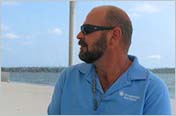|
|
photo by Bruce-Michael Gelbert
|
|
Jean-Pierre Lemarié
|
| ....................................................................................................................................................................................... |
Jean-Pierre Lemarié, Parisian-born pianist and composer, living in New York City, made a welcome return to Fire Island, on July 15, for a virtuoso recital, at the Yamaha at the Cherry Grove Community House, presented by the Arts Project of Cherry Grove. Entitled “A Musical Journey through Time,” and consisting of music from the 17th to 21st centuries, the recital proved a study in musical contrast. Narration was delivered by Miss Electra and by Lemarié himself.
George Frideric Handel’s Chaconne in G Major, grand and imposing theme-and-variations, with a contrastingly quiet, contemplative adagio, made for a brilliant opening, whetting the appetite for the remainder of Lemarié’s program ahead. Lemarié’s selections by Henry Purcell, which followed, were a fresh and breezy Prelude, with dark underpinnings, attributed to the English composer, and a gentle and touching “A New Ground” in E minor, definitely by him and akin to his “When I am laid in earth,” Dido’s lament, from “Dido and Aeneas.” Brimming with vitality, the artist’s twelve florid Wolfgang Amadeus Mozart variations on the children’s song “Ah vous dirais-je Maman,” aka “Twinkle, Twinkle, Little Star,” poised between innocence and sophistication, as ornate and bravura as a coloratura opera aria, were cheerful, but for one melancholy and one moody treatment of the theme.
Ludwig van Beethoven’s 14th Sonata, opus 27 #2 in C-sharp minor, “Quasi una fantasia,” its “moonlit” adagio later echoed in Vincenzo Bellini’s opera “Norma,” took pianist and audience to the cusp of Classicism and Romanticism, as Lemarié played with Classical sensitivity, laced with formidable emotion. Lemarié enveloped us in full-tilt Romanticism with Frédéric Chopin’s peaceful, lyrical Nocturne in C-sharp minor, opus posthumous.
In Claude Debussy’s “L’Isle Joyeuse,” Lemarié limned an ebullient and luminous, wondrous and enchanting land, which he has, in the past, compared with Fire Island. His “Bachianas Brasileiras” #4, “Preludio,” of Heitor Villa-Lobos, was marked by some of the formality of Bach, leavened with fiery Latin American passion. From contemporary composer Alain Louvier’s “Agrexandrins”—a word fusing Alexandrine poetic meter with aggression—Lemarié, attacking the keys with fingers, palms, fists, and forearms, chose “ … La Cloche Frappa l’Air de ses Funestes Coups,” after Victor Hugo’s “La Grand Mère,” anticipating the death of a beloved grandmother, reflecting grieving, struggle, and release, and “ … L’orage est dans ma voix, l’éclair est sur ma bouche,” after Alfred de Vigni’s “Moïse,” suffused with Moses’ ire at finding his people worshipping the Golden Calf.
Finally, we heard Lemarié’s own “Tears,” a Chaconne in G minor, a very personal work-in-progress, recalling the fire that destroyed what had been his Grove home with his ex, Fidel; the brave dog Prince, who alerted the household to the fire, but perished in it; and a French pianist and professor, who influenced the musician. A mesmerizing composition, “Tears” is wrenching, full of turmoil, dramatic, and with quasi-prayerful strains, and was obviously cathartic for Lemarié to write and play. He left us with a light-hearted encore, Chopin’s “Little Fairy Waltz.”
|














